Related Research Articles

Dana Elaine Owens, better known by the stage name Queen Latifah, is an American rapper, actress and singer. She has received various accolades, including a Grammy Award, a Primetime Emmy Award, a Golden Globe Award, three Screen Actors Guild Awards, and two NAACP Image Awards, in addition to a nomination for an Academy Award. In 2006, she became the first hip hop artist to receive a star on the Hollywood Walk of Fame.
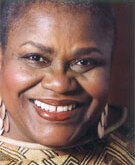
Bernice Johnson Reagon is a song leader, composer, scholar, and social activist, who in the early 1960s was a founding member of the Student Non-violent Coordinating Committee's (SNCC) Freedom Singers in the Albany Movement in Georgia. In 1973, she founded the all-black female a cappella ensemble Sweet Honey in the Rock, based in Washington, D.C. Reagon, along with other members of the SNCC Freedom Singers, realized the power of collective singing to unify the disparate groups who began to work together in the 1964 Freedom Summer protests in the South.
"After a song", Reagon recalled, "the differences between us were not so great. Somehow, making a song required an expression of that which was common to us all.... This music was like an instrument, like holding a tool in your hand."

Maya Angelou was an American memoirist, poet, and civil rights activist. She published seven autobiographies, three books of essays, several books of poetry, and is credited with a list of plays, movies, and television shows spanning over 50 years. She received dozens of awards and more than 50 honorary degrees. Angelou's series of seven autobiographies focus on her childhood and early adult experiences. The first, I Know Why the Caged Bird Sings (1969), tells of her life up to the age of 17 and brought her international recognition and acclaim.

Elaine Brown is an American prison activist, writer, singer, and former Black Panther Party chairwoman who is based in Oakland, California. Brown briefly ran for the Green Party presidential nomination in 2008.

African-American music is a broad term covering a diverse range of musical genres largely developed by African Americans and their culture. Its origins are in musical forms that developed as a result of the enslavement of African Americans prior to the American Civil War. It has been said that "every genre that is born from America has black roots."

Cynthia Delores Tucker was an American politician and civil rights activist. She had a long history of involvement in the American Civil Rights Movement. She was Secretary of the Commonwealth of Pennsylvania from 1971 to 1977. From the 1990s onward, she engaged in a campaign against gangsta rap music.
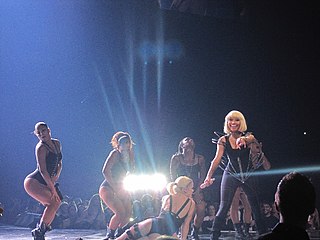
A video vixen is a woman who models and appears in hip hop-oriented music videos. From the 1990s to the early 2010s, the video vixen image was a staple in popular music, particularly within the genre of hip hop. The video vixen first came around in the late 1980s when the hip-hop culture began to emerge into its own lifestyle, although was most popular in American popular culture during the 1990s and 2000s. Many video vixens are aspiring actors, singers, dancers, or professional models. Artists and vixens have been criticized for allegedly contributing to the social degradation of black women. Latinas are also degraded and hyper-sexualized in hip hop music videos because they are seen as objects of sexual desire in rap music videos.

Sue Bailey Thurman was an American author, lecturer, historian and civil rights activist. She was the first non-white student to earn a bachelor's degree in music from Oberlin College, Ohio. She briefly taught at the Hampton Institute in Virginia, before becoming involved in international work with the YWCA in 1930. During a six-month trip through Asia in the mid-1930s, Thurman became the first African-American woman to have an audience with Mahatma Gandhi. The meeting with Gandhi inspired Thurman and her husband, theologian Howard Thurman, to promote non-violent resistance as a means of creating social change, bringing it to the attention of a young preacher, Martin Luther King Jr. While she did not actively protest during the Civil Rights Movement, she served as spiritual counselors to many on the front lines, and helped establish the first interracial, non-denominational church in the United States.

Stereotypes of African Americans are misleading beliefs about the culture of people with partial or total ancestry from any black racial groups of Africa whose ancestors resided in the United States since before 1865, largely connected to the racism and the discrimination to which African Americans are subjected. These beliefs date back to the slavery of black people during the colonial era and they have evolved within American society.

Georgia Davis Powers was an American politician who served for 21 years as a state senator in the Kentucky Senate. In 1967, she was the first person of color elected to the senate. During her term, she was "regarded as the leading advocate for blacks, women, children, the poor, and the handicapped," and was the chair of the Health and Welfare committee from 1970 to 1976 and the Labor and Industry committee from 1978 to 1988.
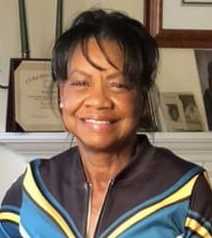
Samaria (Mitcham) Bailey is an African-American woman who is known as an instrumental figure in the civil rights movement. Bailey was one of the first to began desegregation at A. L. Miller Senior High School,an all-white female school located in Macon, Georgia. She would go on to become one of the first African American women accepted to Mercer University. She later became an accomplished pianist, and her story was adapted into a bestselling novel and a stage play.

"On the Pulse of Morning" is a poem by writer and poet Maya Angelou that she read at the first inauguration of President Bill Clinton on January 20, 1993. With her public recitation, Angelou became the second poet in history to read a poem at a presidential inauguration, and the first African American and woman. Angelou's audio recording of the poem won the 1994 Grammy Award in the "Best Spoken Word" category, resulting in more fame and recognition for her previous works, and broadening her appeal.
Misogyny in rap music is defined as lyrics, videos, or other components of rap music that encourage, glorify, justify, or legitimize the objectification, exploitation, or victimization of women. It is an ideology that depicts women as objects for men to own, use, and abuse. It reduces women to expendable beings. It might include everything from innuendos to stereotypical characterizations and defamations.
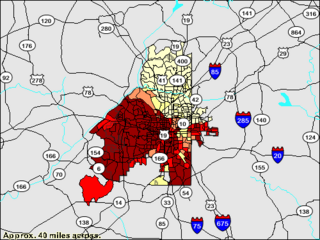
Black Atlantans form a major population group in the Atlanta metropolitan area, encompassing both those of African-American ancestry as well as those of recent Caribbean or African origin. Atlanta has long been known as a center of black entrepreneurship, higher education, political power and culture; a cradle of the Civil Rights Movement.
Hip hop feminism is a sub-set of black feminism that centers on intersectional subject positions involving race and gender in a way that acknowledges the contradictions in being a black feminist, such as black women's enjoyment in hip hop music and culture, rather than simply focusing on the victimization of black women in hip hop culture due to interlocking systems of oppressions involving race, class, and gender.
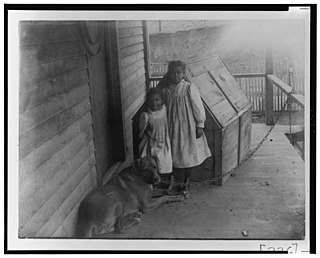
African-American Georgians are residents of the U.S. state of Georgia who are of African American ancestry. As of the 2010 U.S. Census, African Americans were 31.2% of the state's population. Georgia has the second largest African American population in the United States following Texas. Georgia also has a gullah community. African slaves were brought to Georgia during the slave trade.
Misogynoir is a term referring to the combined force of anti-Black racism and misogyny directed towards black women. The term was coined by black feminist writer Moya Bailey in 2008 to address misogyny directed toward black transgender and cisgender women in American visual and popular culture. The concept of misogynoir is grounded in the theory of intersectionality, which analyzes how various social identities such as race, gender, class, age, ability, and sexual orientation interrelate in systems of oppression.
Gloria Travis Tanner was a politician and public figure in Colorado. A Democrat, she served in the Colorado House of Representatives from 1985-1994. In 1994, she became the first African American woman to serve as a Colorado state senator. In 2000, she founded a leadership and training institute for black women in Colorado. She was inducted into the Colorado Women's Hall of Fame in 2002.
Ratchet feminism emerged in the United States from hip hop culture in the early 2000s, largely as a critique of, and a response to, respectability politics. It is distinct from black feminism, womanism, and hip hop feminism. Ratchet feminism coopts the derogatory term (ratchet). Other terms used to describe this concept include ratchet womanism as used by Georgia Tech professor Joycelyn Wilson or ratchet radicalism used by Rutgers professor Brittney Cooper. Ratchet is an identity embraced by many millennials and Gen Z black women and girls. The idea of ratchetness as empowering, or of ratchet feminism, has been articulated by artists and celebrities like Nicki Minaj, City Girls, Amber Rose, and Junglepussy, scholars like Brittney Cooper and Mikki Kendall, and through events like Amber Rose's SlutWalk. Many view ratchet feminism as a form of female empowerment that doesn't adhere to respectability politics.
References
- ↑ "Lakeyta Bonnette-Bailey". Georgia State University . Retrieved February 6, 2023.
- ↑ Cramer, Lauren M. "Lakeyta M. Bonnette, Pulse of the People: Political Rap Music and Black Politics". The Journal of African American History . 102 (2).